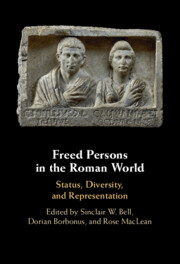Book contents
- Freed Persons in the Roman World
- Freed Persons in the Roman World
- Copyright page
- Contents
- Figures
- Table
- Contributors
- Acknowledgments
- Bibliographical Note
- Introduction
- 1 Permissu decurionum
- 2 Freed Public Slaves in Roman Italy and the Western Provinces
- 3 Fitting in by Decree
- 4 Doubling Up
- 5 The Cost of Ingratitude
- 6 Between Moral Slavery and Legal Freedom
- 7 Framing the Freed Person
- 8 Novel Evidence for Ancient Freed People
- 9 The Affects of Manumission
- General Bibliography
- Index
- References
5 - The Cost of Ingratitude
Freed Persons, Patrons, and Re-enslavement*
Published online by Cambridge University Press: 16 May 2024
- Freed Persons in the Roman World
- Freed Persons in the Roman World
- Copyright page
- Contents
- Figures
- Table
- Contributors
- Acknowledgments
- Bibliographical Note
- Introduction
- 1 Permissu decurionum
- 2 Freed Public Slaves in Roman Italy and the Western Provinces
- 3 Fitting in by Decree
- 4 Doubling Up
- 5 The Cost of Ingratitude
- 6 Between Moral Slavery and Legal Freedom
- 7 Framing the Freed Person
- 8 Novel Evidence for Ancient Freed People
- 9 The Affects of Manumission
- General Bibliography
- Index
- References
Summary
In book 3 of De beneficiis, Seneca the Younger notes the common use of a law punishing ingratitude in rhetorical training and debates the merits of introducing a comparable law into Roman civil law. Ultimately, he dismisses the need for such a law outside of the school setting (Ben. 3.6–17.3). Scholars have been quick to point out that Seneca is not exactly correct: legal cases were brought for certain instances of ingratitude. I would like to consider one such instance, the fate of the liberti legally rendered ingrati. The penalties for ingratitude varied as the forms of ingratitude did, but I will focus on the extreme penalty of re-enslavement. This chapter takes as its premise the debate in Tacitus’ Annales (13.26–27) on allowing re-enslavement to become a standard penalty for a freed person’s ingratitude. The re-enslavement supporters fail to win over Nero, but the emperor allows that individual cases for re-enslavement could be heard. I will argue that this lack of statutory regulation for this penalty paradoxically reveals the precarity of the freed person, their citizenship, and their freedom. This precarity is emphasized using the language of social relations rather than the law to describe the situation of the freed person and their former owner. This chapter will contribute to the study of the nature of Roman freedom by considering the following questions: did freed persons share in the same liberty as freeborn citizens? And if that liberty is different, to what extent can a freed person be integrated into the “free” population?
- Type
- Chapter
- Information
- Freed Persons in the Roman WorldStatus, Diversity, and Representation, pp. 141 - 163Publisher: Cambridge University PressPrint publication year: 2024
References
- 1
- Cited by

